《翻译(二)》作业
- 格式:rtf
- 大小:9.38 MB
- 文档页数:7

英语翻译二级笔译实务模拟试题及答案解析(10)(1/2)Section ⅠEnglish-Chinese TranslationTranslate the following two passages into Chinese.Part A Compulsory Translation第1题There was, last week, a glimmer of hope in the world food crisis. Expecting a bumper harvest, Ukraine relaxed restrictions on exports. Overnight, global wheat prices fell by 10 percent.By contrast, traders in Bangkok quote rice prices around $1,000 a ton, up from $460 two months ago.Such is the volatility of today's markets. We do not know how high food prices might go, nor how far they could fall. But one thing is certain: We have gone from an era of plenty to one of scarcity. Experts agree that food prices are not likely to return to the levels the world had grown accustomed to any time soon.Imagine the situation of those living on less than $1 a day—the "bottom billion," the poorest of the world's poor. Most live in Africa, and many might typically spend two-thirds of their income on food.In Liberia last week, I heard how people have stopped purchasing imported rice by the bag. Instead, they increasingly buy it by the cup, because that's all they can afford.Traveling through West Africa, I found good reason for optimism. In Burkina Faso, I saw a government working to import drought resistant seeds and better manage scarce water supplies, helped by nations like Brazil. In Ivory Coast, we saw a women's cooperative running a chicken farm set up with UN funds. The project generated income—and food—for villagers in ways that can easily be replicated.Elsewhere, I saw yet another women's group slowly expanding their local agricultural production, with UN help. Soon they will replace World Food Program rice with their own home-grown produce, sufficient to cover the needs of their school feeding program.These are home-grown, grass-roots solutions for grass-roots problems—precisely the kind of solutions that Africa needs.下一题(2/2)Section ⅠEnglish-Chinese TranslationTranslate the following two passages into Chinese.Part A Compulsory Translation第2题LONDON—Webster's Dictionary defines plague as "anything that afflicts or troubles; calamity; scourge." Further definitions include "any contagious epidemic disease that is deadly; esp., bubonic plague" and, from the Bible, "any of various calamities sent down as divine punishment." The verb form means "to vex; harass; trouble; torment."In Albert Camus' novel, The Plague, written soon after the Nazi occupation of France, the first sign of the epidemic is rats dying in numbers: "They came up from basements and cubby-holes, cellars and drains, in long swaying lines; they staggered in the light, collapsed and died, right next to people. At night, in corridors and side-streets, one could clearly hear the tiny squeaks as they expired. In the morning, on the outskirts of town, you would find them stretched out in the gutter with a little floret of blood on their pointed muzzles, some blown up and rotting, other stiff,with their whiskers still standing up."The rats are messengers, but—human nature being what it is—their message is not immediately heeded. Life must go on. There are errands to run, money to be made. The novel is set in Oran, an Algerian coastal town of commerce and lassitude, where the heat rises steadily to the point that the sea changes color, deep blue turning to a "sheen of silver or iron, making it painful to look at." Even when people start to die—their lymph nodes swollen, blackish patches spreading on their skin, vomiting bile, gasping for breath—the authorities' response is hesitant. The word "plague" is almost unsayable. In exasperation, the doctor-protagonist tells a hastily convened health commission: "I don't mind the form of words. Let's just say that we should not act as though half the town were not threatened with death, because then it would be."The sequence of emotions feels familiar. Denial is followed by faint anxiety, which is followed by concern, which is followed by fear, which is followed by panic. The phobia is stoked by the sudden realization that there are uncontrollable dark forces, lurking in the drains and the sewers, just beneath life's placid surface. The disease is a leveler, suddenly everyone is vulnerable, and the moral strength of each individual is tested. The plague is on everyone's minds, when it's not in their bodies. Questions multiply: What is the chain of transmission? How to isolate the victims?Plague and epidemics are a thing of the past, of course they are. Physical contact has been cut to a minimum in developed societies. Devices and their digital messages direct our lives. It is not necessary to look into someone's eyes let alone touch their skin in order to become, somehow, intimate. Food is hermetically sealed. Blood, secretions, saliva, pus, bodily fluids—these are things with which hospitals deal, not matters of daily concern.A virus contracted in West Africa, perhaps by a man hunting fruit bats in a tropical forest to feed his family, and cutting the bat open, cannot affect a nurse in Dallas, Texas, who has been wearing protective clothing as she tended a patient who died. Except that it does. "Pestilence is in fact very common," Camus observes, "but we find it hard to believe in a pestilence when it descends upon us."The scary thing is that the bat that carries the virus is not sick. It is simply capable of transmitting the virus in the right circumstances. In other words, the virus is always lurking even if invisible. It is easily ignored until it is too late.Pestilence, of course, is a metaphor as well as a physical fact. It is not just blood oozing from gums and eyes, diarrhea and vomiting. A plague had descended on Europe as Camus wrote. The calamity and slaughter were spreading through the North Africa where he had passed his childhood. This virus hopping today from Africa to Europe to the United States has come in a time of beheadings and unease. People put the phenomena together as denial turns to anxiety and panic. They sense the stirring of uncontrollable forces. They want to be wrong but they are not sure they are.At the end of the novel, the doctor contemplates a relieved throng that has survived: "He knew that this happy crowd was unaware of something that one can read in books, which is that the plague bacillus never dies or vanishes entirely, that it can remain dormant for dozens of years in furniture or clothing, that it waits patiently in bedrooms, cellars, trunks, handkerchiefs and old papers, and that perhaps the day will come when, for the instruction or misfortune of mankind, the plague will rouse its rats and send them to die in some well-contented city."上一题下一题(1/2)Section ⅡChinese-English TranslationThis section consists of two parts, Part A—"Compulsory Translation" and Part B— "Choice of Two Translations" consisting of two sections "Topic 1" and "Topic 2". For the passage in Part A and your choice of passages in Part B, translate the underlined portions, including titles, into English. Above your translation of Part A, write "Compulsory Translation" and above your translation from Part B, write "Topic 1" or "Topic 2".第3题中华文明经历了5000多年的历史变迁,但始终一脉相承,积淀着中华民族最深层的精神追求,代表着中华民族独特的精神标识,为中华民族生生不息、发展壮大供了丰厚滋养。
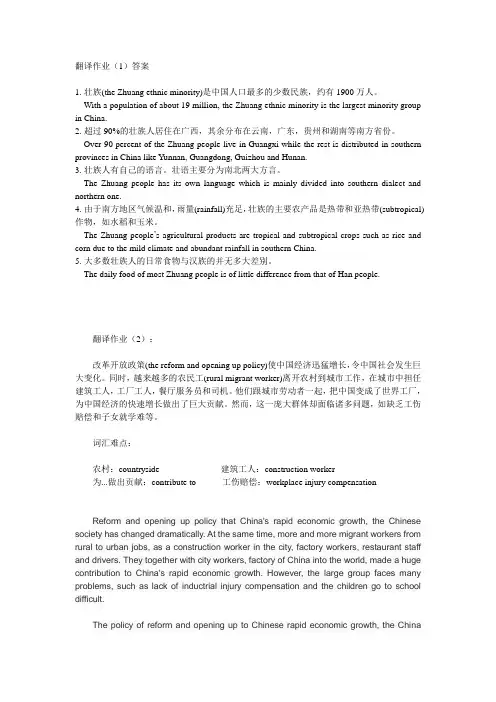
翻译作业(1)答案1.壮族(the Zhuang ethnic minority)是中国人口最多的少数民族,约有1900万人。
With a population of about 19 million, the Zhuang ethnic minority is the largest minority group in China.2.超过90%的壮族人居住在广西,其余分布在云南,广东,贵州和湖南等南方省份。
Over 90 percent of the Zhuang people live in Guangxi while the rest is distributed in southern provinces in China like Yunnan, Guangdong, Guizhou and Hunan.3.壮族人有自己的语言。
壮语主要分为南北两大方言。
The Zhuang people has its own language which is mainly divided into southern dialect and northern one.4.由于南方地区气候温和,雨量(rainfall)充足,壮族的主要农产品是热带和亚热带(subtropical)作物,如水稻和玉米。
The Zhuang people’s agricultural products are tropical and subtropical crops such as rice and corn due to the mild climate and abundant rainfall in southern China.5.大多数壮族人的日常食物与汉族的并无多大差别。
The daily food of most Zhuang people is of little difference from that of Han people.翻译作业(2):改革开放政策(the reform and opening up policy)使中国经济迅猛增长,令中国社会发生巨大变化。
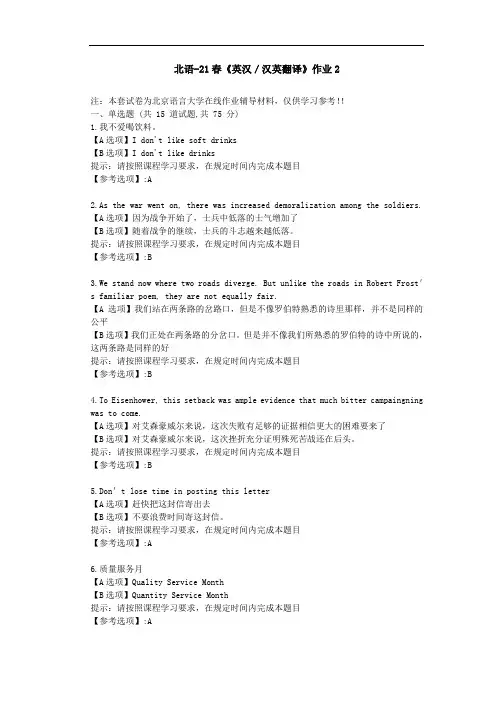
北语-21春《英汉/汉英翻译》作业2注:本套试卷为北京语言大学在线作业辅导材料,仅供学习参考!!一、单选题 (共 15 道试题,共 75 分)1.我不爱喝饮料。
【A选项】I don't like soft drinks【B选项】I don't like drinks提示:请按照课程学习要求,在规定时间内完成本题目【参考选项】:A2.As the war went on, there was increased demoralization among the soldiers. 【A选项】因为战争开始了,士兵中低落的士气增加了【B选项】随着战争的继续,士兵的斗志越来越低落。
提示:请按照课程学习要求,在规定时间内完成本题目【参考选项】:B3.We stand now where two roads diverge. But unlike the roads in Robert Frost's familiar poem, they are not equally fair.【A选项】我们站在两条路的岔路口,但是不像罗伯特熟悉的诗里那样,并不是同样的公平【B选项】我们正处在两条路的分岔口。
但是并不像我们所熟悉的罗伯特的诗中所说的,这两条路是同样的好提示:请按照课程学习要求,在规定时间内完成本题目【参考选项】:B4.To Eisenhower, this setback was ample evidence that much bitter campaingning was to come.【A选项】对艾森豪威尔来说,这次失败有足够的证据相信更大的困难要来了【B选项】对艾森豪威尔来说,这次挫折充分证明殊死苦战还在后头。
提示:请按照课程学习要求,在规定时间内完成本题目【参考选项】:B5.Don't lose time in posting this letter【A选项】赶快把这封信寄出去【B选项】不要浪费时间寄这封信。
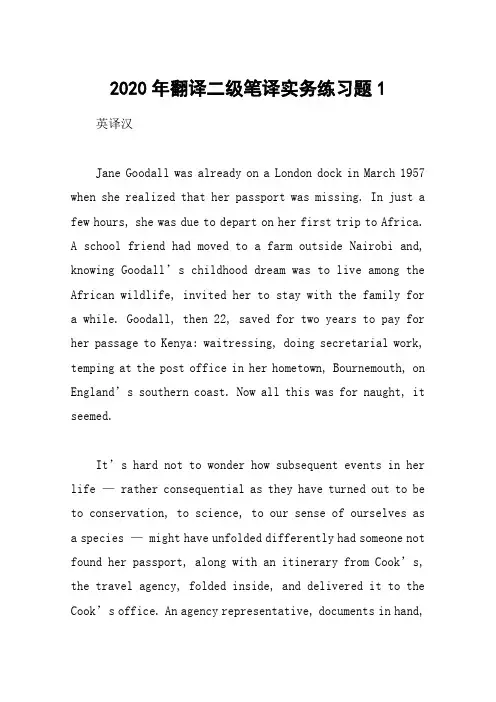
2020年翻译二级笔译实务练习题1 英译汉Jane Goodall was already on a London dock in March 1957 when she realized that her passport was missing. In just a few hours, she was due to depart on her first trip to Africa.A school friend had moved to a farm outside Nairobi and, knowing Goodall’s childhood dream was to live among the African wildlife, invited her to stay with the family for a while. Goodall, then 22, saved for two years to pay for her passage to Kenya: waitressing, doing secretarial work, temping at the post office in her hometown, Bournemouth, on England’s southern coast. Now all this was for naught, it seemed.It’s hard not to wonder how subsequent events in her life — rather consequential as they have turned out to be to conservation, to science, to our sense of ourselves as a species — might have unfolded differently had someone not found her passport, along with an itinerary from Cook’s, the travel agency, folded inside, and delivered it to the Cook’s office. An agency representative, documents in hand,found her on the dock. “Incredible,” Goodall told me last month, recalling that day. “Amazing.”Within two months of her arrival, Goodall met the paleontologist Louis Leakey — Nairobi was a small town for its white population in those days — and he immediately offered her a job at the natural-history museum where he was curator. He spent much of the next three years testing her capacity for repetitive work.He believed in a hypothesis first put forth by Charles Darwin that humans and chimpanzees share an evolutionary ancestor. Close study of chimpanzees in the wild, he thought, might tell us something about that common progenitor. He was, in other words, looking for someone to live among Africa’s wild animals. One night, he told Goodall that he knew just the place where she could do it: Gombe Stream Chimpanzee Reserve, in the British colony of Tanganyika (now Tanzania).In July 1960, Goodall boarded a boat and after a few hours motoring over the warm, deep waters of Lake Tanganyika, she stepped onto the pebbly beach at Gombe.Her finding, published in Nature in 1964, thatchimpanzees use tools — extracting insects from a termite mound with leaves of grass —drastically and forever altered humanity’s understanding of itself; man was no longer the natural world’s only user of tools.After two and a half decades of living out her childhood dream, Goodall made an abrupt career shift, from scientist to conservationist.1957年3月,当珍妮·古道尔(Jane Goodall)在伦敦码头候船时,她发现护照不见了。
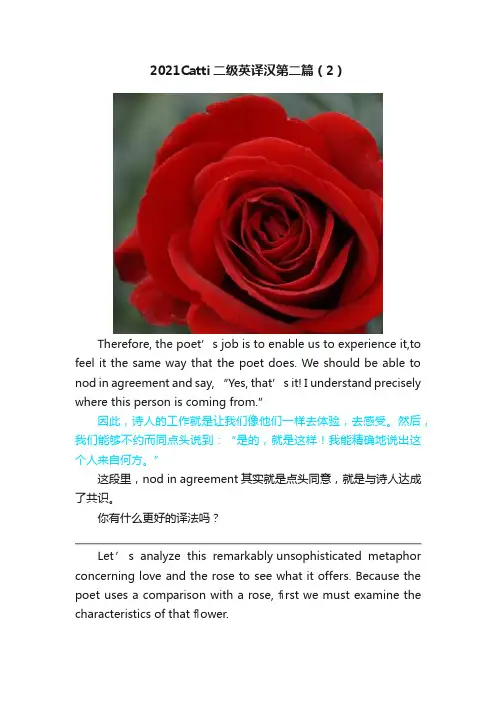
2021Catti二级英译汉第二篇(2)Therefore, the poet’s job is to enable us to experience it,to feel it the same way that the poet does. We should be able to nod in agreement and say, “Yes, that’s it! I understand precisely where this person is coming from.”因此,诗人的工作就是让我们像他们一样去体验,去感受。
然后,我们能够不约而同点头说到:“是的,就是这样!我能精确地说出这个人来自何方。
”这段里,nod in agreement其实就是点头同意,就是与诗人达成了共识。
你有什么更好的译法吗?Let’s analyze this remarkably unsophisticated metaphor concerning love and the rose to see what it offers. Because the poet uses a comparison with a rose, first we must examine the characteristics of that flower.让我们来分析一下这个有关爱情与玫瑰的超级简单的隐喻所要表达的内容。
因为,诗人将玫瑰比作对照物,所以,我们首先要看看这种花的特点是什么。
这段里remarkably unsophisticated 重点应该在unsophisticated上,前面用remarkably这个副词修辞,说明十分不高级,即超级简单。
what it offers在翻译时,我们当然不能直接翻译成“它提供了什么”,而要换成符合目标语的“它所要表达的内容”,这样读起来才顺畅。
comparison这里,我觉得翻译成参照物更顺一些。
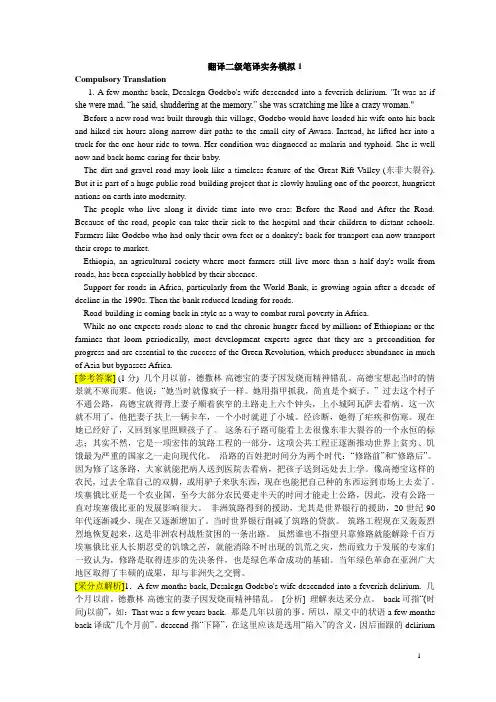
翻译二级笔译实务模拟1Compulsory Translation1. A few months back, Desalegn Godebo's wife descended into a feverish delirium. "It was as if she were mad, “he said, shuddering at the memory.” she was scratching me like a crazy woman." Before a new road was built through this village, Godebo would have loaded his wife onto his back and hiked six hours along narrow dirt paths to the small city of Awasa. Instead, he lifted her into a truck for the one-hour ride to town. Her condition was diagnosed as malaria and typhoid. She is well now and back home caring for their baby.The dirt-and-gravel road may look like a timeless feature of the Great Rift Valley (东非大裂谷). But it is part of a huge public road-building project that is slowly hauling one of the poorest, hungriest nations on earth into modernity.The people who live along it divide time into two eras: Before the Road and After the Road. Because of the road, people can take their sick to the hospital and their children to distant schools. Farmers like Godebo who had only their own feet or a donkey's back for transport can now transport their crops to market.Ethiopia, an agricultural society where most farmers still live more than a half-day's walk from roads, has been especially hobbled by their absence.Support for roads in Africa, particularly from the World Bank, is growing again after a decade of decline in the 1990s. Then the bank reduced lending for roads.Road-building is coming back in style as a way to combat rural poverty in Africa.While no one expects roads alone to end the chronic hunger faced by millions of Ethiopians or the famines that loom periodically, most development experts agree that they are a precondition for progress and are essential to the success of the Green Revolution, which produces abundance in much of Asia but bypasses Africa.[参考答案] (1分) 几个月以前,德撒林·高德宝的妻子因发烧而精神错乱。
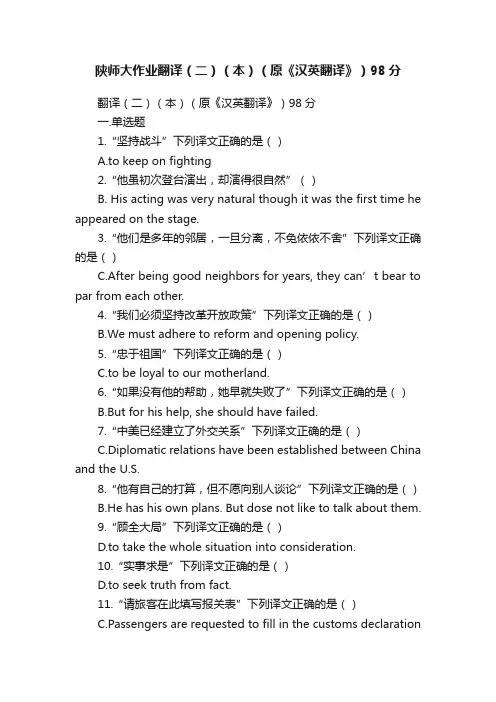
陕师大作业翻译(二)(本)(原《汉英翻译》)98分翻译(二)(本)(原《汉英翻译》)98分一.单选题1.“坚持战斗”下列译文正确的是()A.to keep on fighting2.“他虽初次登台演出,却演得很自然”()B. His acting was very natural though it was the first time he appeared on the stage.3.“他们是多年的邻居,一旦分离,不免依依不舍”下列译文正确的是()C.After being good neighbors for years, they can’t bear to par from each other.4.“我们必须坚持改革开放政策”下列译文正确的是()B.We must adhere to reform and opening policy.5.“忠于祖国”下列译文正确的是()C.to be loyal to our motherland.6.“如果没有他的帮助,她早就失败了”下列译文正确的是()B.But for his help, she should have failed.7.“中美已经建立了外交关系”下列译文正确的是()C.Diplomatic relations have been established between China and the U.S.8.“他有自己的打算,但不愿向别人谈论”下列译文正确的是()B.He has his own plans. But dose not like to talk about them.9.“顾全大局”下列译文正确的是()D.to take the whole situation into consideration.10.“实事求是”下列译文正确的是()D.to seek truth from fact.11.“请旅客在此填写报关表”下列译文正确的是()C.Passengers are requested to fill in the customs declarationfrom here.12.“全球经济”下列译文正确的是()D. Global economy13.“这次演出根本没有失败,而是很成功”下列译文正确的是()D.The show was far from being a failure, it was a great success.14.“到场的来宾中有一些外国记者”下列译文正确的是()D.The guests present, included a few foreign newsman.15.“你最好还是询问那些消息灵通人士”下列译文正确的是()A.You should better ask those better informed.16.“城乡差别”下列译文正确的是()E.differences between town and country.17.“该计划将由一个特别委员会加以审查”下列译文正确的是()A.The plan will be examined by a special committee.18.“改革开放政策”下列译文正确的是()A.reform and opening policy.19.“经济基础”下列译文正确的是()B.economic foundations.20.“接到你都来信,非常高兴”下列译文正确的是()A.I am very glad to have received your letter.21.“我们一定要用一切可能的办法帮助他们”下列译文正确的是()B.We must help them in every way possible22.“她的头发长的几乎拖地了”下列译文正确的是()C.Her hair is so long as to be trailing over the floor.23.“满头大汗”下列译文正确的是()D.to sweat all over24.“我很高兴看见你安然无恙”下列译文正确的是()C.I am glade to see you safe and sound25.“能不能提前完成计划呢”下列译文正确的是()A.Is it possible to fulfill the plan ahead of time?26.“门类齐全”下列译文正确的是()A.To be complete in range27.“据谣传,那场事故是由于玩忽职守造成的”下列译文正确的是()A.It is rumoured that the accident was due to negligence.28.“外交关系”下列译文正确的是()C.diplomatic relations29.“我们应当逐渐消灭城乡差别”下列译文正确的是()D.We should gradually eliminate the pollution30.“贪官污吏”下列译文正确的是()A.corrupt officials二.多选题1.“然而”下列译文正确的是()B.HoweverC.Thus2.“关注”下列译文正确的是()A.pay attention toC.FocusD.concentrate3.“谈论”下列译文正确的是()B.discussC.talk ofD.speak about4.“由于”下列译文正确的是()A.due toB.owing to5.“完成”下列译文正确的是()B.finishC.accomplish6.“坚持”下列译文正确的是()A. Insist onB.hold onC.persist in7.“心不在焉”下列译文正确的是()A. Absent-mindedC. Absence of mind8.“奉献”下列译文正确的是()A. Devote toC. Dedicate to9.“咨询”下列译文正确的是()A. Seek advice fromB. consult10.“提前”下列译文正确的是()A.in advanceB. Ahead of scheduleC.ahead of time三.判断题1.She saw him go upstairs a moment ago.(错误)2.Be sure to put the letter where you can find it.(正确)3.The teacher advised his students read and write more.(错误)4.The child is enough old to start school.(正确)5.She must be an expert or anything.(错误)6.Eight hour’s sleep must be guaranteed.(错误)7.He jumped for joy when i told him the news.(错误)8.He was too excited that he could not fall asleep.(错误)9. Efforts have been made to ensure a better life for the people.(错误)10.Seating on a stone, She wiped her sweating face with hercloth.(错误)。
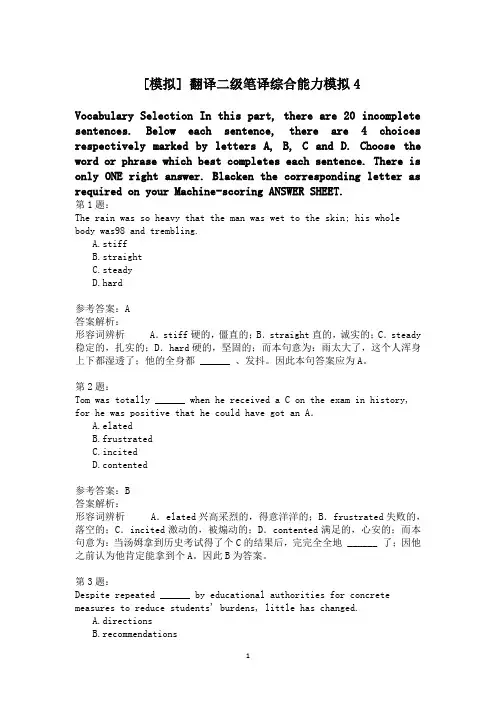
[模拟] 翻译二级笔译综合能力模拟4Vocabulary Selection In this part, there are 20 incomplete sentences. Below each sentence, there are 4 choices respectively marked by letters A, B, C and D. Choose the word or phrase which best completes each sentence. There is only ONE right answer. Blacken the corresponding letter as required on your Machine-scoring ANSWER SHEET.第1题:The rain was so heavy that the man was wet to the skin; his whole body was98 and trembling.A.stiffB.straightC.steadyD.hard参考答案:A答案解析:形容词辨析 A.stiff硬的,僵直的;B.straight直的,诚实的;C.steady 稳定的,扎实的;D.hard硬的,坚固的;而本句意为:雨太大了,这个人浑身上下都湿透了;他的全身都 ______ 、发抖。
因此本句答案应为A。
第2题:Tom was totally ______ when he received a C on the exam in history, for he was positive that he could have got an A.A.elatedB.frustratedC.incitedD.contented参考答案:B答案解析:形容词辨析 A.elated兴高采烈的,得意洋洋的;B.frustrated失败的,落空的;C.incited激动的,被煽动的;D.contented满足的,心安的;而本句意为:当汤姆拿到历史考试得了个C的结果后,完完全全地 ______ 了;因他之前认为他肯定能拿到个A。
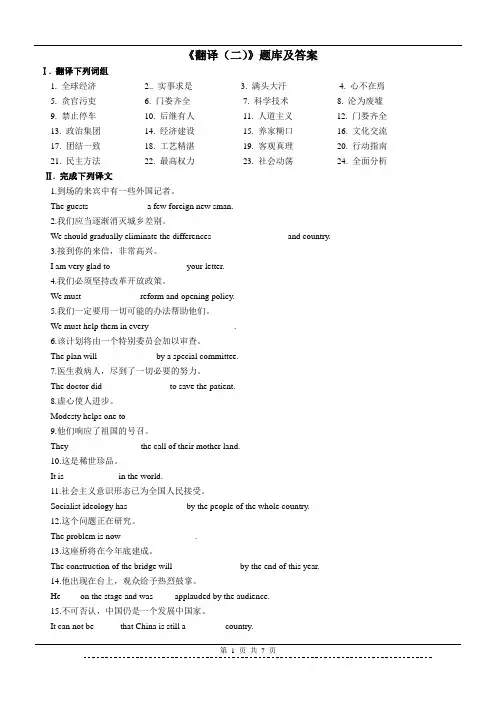
《翻译(二)》题库及答案Ⅰ. 翻译下列词组1. 全球经济2.. 实事求是3. 满头大汗4. 心不在焉5. 贪官污吏6. 门娄齐全7. 科学技术8. 沦为废墟9. 禁止停车10. 后继有人11. 人道主义12. 门娄齐全13. 政治集团14. 经济建设15. 养家糊口16. 文化交流17. 团结一致18. 工艺精湛19. 客观真理20. 行动指南21. 民主方法22. 最高权力23. 社会动荡24. 全面分析Ⅱ. 完成下列译文1.到场的来宾中有一些外国记者。
The guests_______ ______a few foreign new sman.2.我们应当逐渐消灭城乡差别。
We should gradually eliminate the differences_________ ________and country.3.接到你的来信,非常高兴。
I am very glad to _______ _________ your letter.4.我们必须坚持改革开放政策。
We must ______ ______ reform and opening policy.5.我们一定要用一切可能的办法帮助他们。
We must help them in every________ ___________.6.该计划将由一个特别委员会加以审查。
The plan will ______ ______ by a special committee.7.医生救病人,尽到了一切必要的努力。
The doctor did _______ _______ to save the patient.8.虚心使人进步。
Modesty helps one to _______ ________9.他们响应了祖国的号召。
They _______ ________ the call of their mother land.10.这是稀世珍品。
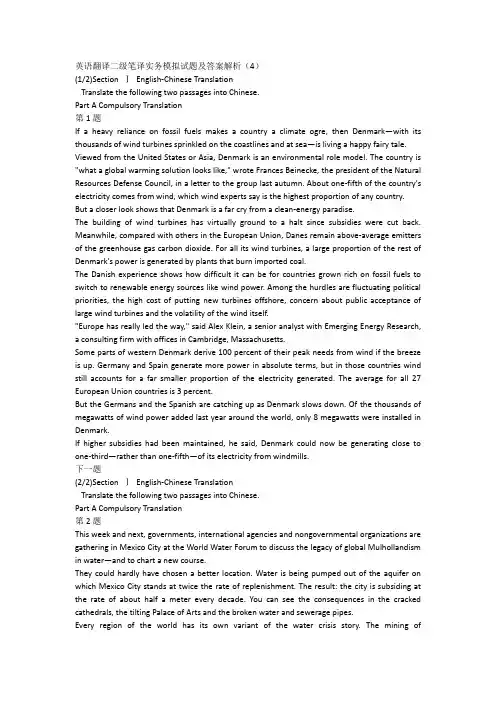
英语翻译二级笔译实务模拟试题及答案解析(4)(1/2)Section ⅠEnglish-Chinese TranslationTranslate the following two passages into Chinese.Part A Compulsory Translation第1题If a heavy reliance on fossil fuels makes a country a climate ogre, then Denmark—with its thousands of wind turbines sprinkled on the coastlines and at sea—is living a happy fairy tale. Viewed from the United States or Asia, Denmark is an environmental role model. The country is "what a global warming solution looks like," wrote Frances Beinecke, the president of the Natural Resources Defense Council, in a letter to the group last autumn. About one-fifth of the country's electricity comes from wind, which wind experts say is the highest proportion of any country. But a closer look shows that Denmark is a far cry from a clean-energy paradise.The building of wind turbines has virtually ground to a halt since subsidies were cut back. Meanwhile, compared with others in the European Union, Danes remain above-average emitters of the greenhouse gas carbon dioxide. For all its wind turbines, a large proportion of the rest of Denmark's power is generated by plants that burn imported coal.The Danish experience shows how difficult it can be for countries grown rich on fossil fuels to switch to renewable energy sources like wind power. Among the hurdles are fluctuating political priorities, the high cost of putting new turbines offshore, concern about public acceptance of large wind turbines and the volatility of the wind itself."Europe has really led the way," said Alex Klein, a senior analyst with Emerging Energy Research, a consulting firm with offices in Cambridge, Massachusetts.Some parts of western Denmark derive 100 percent of their peak needs from wind if the breeze is up. Germany and Spain generate more power in absolute terms, but in those countries wind still accounts for a far smaller proportion of the electricity generated. The average for all 27 European Union countries is 3 percent.But the Germans and the Spanish are catching up as Denmark slows down. Of the thousands of megawatts of wind power added last year around the world, only 8 megawatts were installed in Denmark.If higher subsidies had been maintained, he said, Denmark could now be generating close to one-third—rather than one-fifth—of its electricity from windmills.下一题(2/2)Section ⅠEnglish-Chinese TranslationTranslate the following two passages into Chinese.Part A Compulsory Translation第2题This week and next, governments, international agencies and nongovernmental organizations are gathering in Mexico City at the World Water Forum to discuss the legacy of global Mulhollandism in water—and to chart a new course.They could hardly have chosen a better location. Water is being pumped out of the aquifer on which Mexico City stands at twice the rate of replenishment. The result: the city is subsiding at the rate of about half a meter every decade. You can see the consequences in the cracked cathedrals, the tilting Palace of Arts and the broken water and sewerage pipes.Every region of the world has its own variant of the water crisis story. The mining ofgroundwaters for irrigation has lowered the water table in parts of India and Pakistan by 30 meters in the past three decades. As water goes down, the cost of pumping goes up, undermining the livelihoods of poor farmers.What is driving the global water crisis? Physical availability is part of the problem. Unlike oil or coal, water is an infinitely renewable resource, but it is available in a finite quantity. With water use increasing at twice the rate of population growth, the amount available per person is shrinking—especially in some of the poorest countries.Challenging as physical scarcity may be in some countries, the real problems in water go deeper. The 20th-century model for water management was based on a simple idea: that water is an infinitely available free resource to be exploited, dammed or diverted without reference to scarcity or sustainability.Across the world, water-based ecological systems—rivers, lakes and watersheds—have been taken beyond the frontiers of ecological sustainability by policy makers who have turned a blind eye to the consequences of over-exploitation.We need a new model of water management for the 21st century. What does that mean? For starters, we have to stop using water like there's no tomorrow—and that means using it more efficiently at levels that do not destroy our environment. The buzz-phrase at the Mexico Water forum is "integrated water resource management." What it means is that governments need to manage the private demand of different users and manage this precious resource in the public interest.上一题下一题(1/2)Section ⅡChinese-English TranslationThis section consists of two parts, Part A—"Compulsory Translation" and Part B— "Choice of Two Translations" consisting of two sections "Topic 1" and "Topic 2". For the passage in Part A and your choice of passages in Part B, translate the underlined portions, including titles, into English. Above your translation of Part A, write "Compulsory Translation" and above your translation from Part B, write "Topic 1" or "Topic 2".第3题江西素有“物华天宝、人杰地灵”的美誉,是中国革命的红色摇篮,也是人文福地,山川秀美,文化底蕴深厚,特别是佛道教文化历史悠久,祖庭众多。
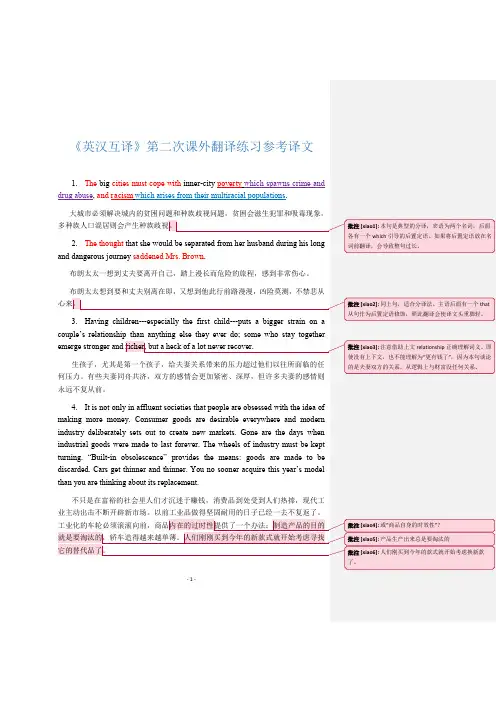
英语笔译二级试题及答案一、词汇翻译(共10分,每题1分)1. 翻译下列单词或短语:- 创新:innovation- 可持续发展:sustainable development- 人工智能:artificial intelligence- 经济增长:economic growth- 环境保护:environmental protection2. 翻译下列句子中的划线部分:- 他是一个多才多艺的艺术家。
(多才多艺)- 我们正在寻求一个平衡点来解决这个问题。
(寻求)- 这个项目的成功依赖于团队的协作。
(依赖于)- 政府已经采取了一系列措施来提高教育质量。
(采取了一系列措施)- 她对这个问题的看法非常独特。
(看法)二、句子翻译(共20分,每题4分)1. 随着科技的发展,远程工作变得越来越普遍。
With the advancement of technology, remote work is becoming increasingly common.2. 教育对于一个国家的繁荣至关重要。
Education is crucial to the prosperity of a nation.3. 我们应当尊重每个人的文化差异。
We should respect the cultural differences of every individual.4. 这个政策旨在减少贫困并提高人们的生活水平。
This policy aims to reduce poverty and improve thestandard of living.5. 环境污染已经成为全球性的问题。
Environmental pollution has become a global issue.三、段落翻译(共30分,每题10分)1. 翻译下列段落:随着全球化的不断深入,各国之间的经济联系日益紧密。
国际贸易的增加促进了世界经济的增长,同时也带来了一些挑战,如贸易不平衡和市场保护主义。
《翻译(二)》作业Ⅰ. 翻译下列词组1. 全球经济2.. 实事求是3. 满头大汗4. 心不在焉5. 贪官污吏6. 门娄齐全7. 科学技术8. 沦为废墟9. 禁止停车10. 后继有人11. 人道主义12. 门娄齐全13. 政治集团14. 经济建设15. 养家糊口16. 文化交流17. 团结一致18. 工艺精湛19. 客观真理20. 行动指南21. 民主方法22. 最高权力23. 社会动荡24. 全面分析Ⅱ. 完成下列译文1.到场的来宾中有一些外国记者。
The guests_______ ______a few foreign new sman.2.我们应当逐渐消灭城乡差别。
We should gradually eliminate the differences_________ ________and country.3.接到你的来信,非常高兴。
I am very glad to _______ _________ your letter.4.我们必须坚持改革开放政策。
We must ______ ______ reform and opening policy.5.我们一定要用一切可能的办法帮助他们。
We must help them in every________ ___________.6.该计划将由一个特别委员会加以审查。
The plan will ______ ______ by a special committee.7.医生救病人,尽到了一切必要的努力。
The doctor did _______ _______ to save the patient.8.虚心使人进步。
Modesty helps one to _______ ________9.他们响应了祖国的号召。
They _______ ________ the call of their mother land.10.这是稀世珍品。
翻译作业21.According to the author, how many types of unqualified translation arethere? Please list them out and illustrate with examples.(1). 错译如:同志!说起来可是······一家子,三几年没有穿新衣呀!原译:“Comrade! Let’s treat each other as one family,” the old woman said.”We haven’t had new clothes for over three years.”改译:Comrade, I'm very sorry to say, nobody in our family has ever had any new clothes for about three years.(2). 漏译如:群众是复杂的,工作又很多。
原译:The masses of people are complex. Especially in the present masses there are extremely complex elements.改译:The situations are very complicated with the masses of the people. And we have a lot of work to do.(3).马虎翻译如:Try to be modest and prudent, guard against complacency.原译:要谦虚谨慎,戒骄戒躁。
改译:要谦虚谨慎,防止自满情绪。
(4). 表达失误如:He is physically weak but mentally sound.原译:他身体虽弱,但思想健康。
《翻译(二)》作业参考答案Ⅰ.1.global economy2.to seek truth from fact3.to sweat all over4.absence of mind /absent-minded5.corrupt officials6.to be complete in range7. science and technology 8.to be reduced to ruins9.No parking 10.no lack of successors11.humanitarianism 12.to be complete in range13.political groups 14.eonomic construction15.keep one’s families alive 16.cultural exchange17.unite as one 18.fine workmanship19.objectire truth 20.a guide to action21.democratic method 22.supreme power23.social unrest 24.a comprehensive analysisⅡ.1.present, included2.between, town3.have received4.adhere to5.way. possible6.be examined7.everthing necessary 8.go forward9.responded to 10.something rare11.been accepted 12.being studied13.be completed 14.appeared, warmly15.denied, developing 16.diappointment, take17.far from 18.short of19.be clarified 20.are requested21.live up 22.few, in23.far from 24.earn, keepⅢ.1.must be guaranteed2.or something3.so excited4.old enough5.for joy6.the letter where you7.too old to learn 8.to the naked eye9.raised such a 10.to be set right11.had his house painted 12.moved to tears13.properly handled 14.capable of anything15.so rotten a condition 16.was arranged17.have him locked up 18.eyes on the screen19. He who makes 20.so fast that21.strong enough 22.clear explanation23.against the wall 24.Arriving at theⅣ.1.He dedicated (or: devoted) his whole life to serving the people.2.His acting was very natural though it was the first time he appeared on the stage.3.After being good neighbors for years, they can’t bear to part from each other.4.you had better ask those better informed5.passengers are requested to fill in the customs declaration from here.6.I am glad to see you safe and sound7. He was arrested (or: apprehended) on a charge of forgery.8.The first and most important task for us is to push forward the modernization of china’s economy.9.It is quite necessary for us to exchange ideas.10.Su shi was one of ancient Chinese writers.11.The boy who had been seriously injured was immediately admitted into the hospital.12.The thought of returning to his motherland never deserted him.13.The peace talks were being held in paris then.14.She felt too dizzy to remember the way.15.What language is spoken there?16.He had been waiting so long as to be impatient in the drawing room.17.That means the task has been entrusted to him.18.We can not compel people to accept one particular school of thought.19.Our unity has been further strengthened.20.His hint escaped me.21.Deal with a man as he deals with you.22.She was too excited to speak.23.The mother called her child back to prepare for his lessons.24.More than fifty countries decided to send their delegations to the conference.Ⅴ.ANo one’s road is absolutely straight, without any forks in it. At some of these forks——whether they require a choice on a question of politics, or private affairs——a step in the wrong direction may affect you only temporarily, or it may influence your entire life. Before liberation, because the social environment was rotten, many young people didn’t realize this and wasted their energy. Some were always busy over trivialities without making the slightest contribution to society. After liberation, youth Leaguer Xu Gaixia, although she was only a country girl, came to understand quite early what kind of attitude a person ought to have towards life.BBackwardness must be perceived before it can be changed.A person must learn from the advanced before he can catch up and surpass them. Of course, to raise China’s scientific and technological level we must rely on our own efforts, develop our own inventions, and adhere to the policy of independenceand self-reliance. But independence does not mean shutting the door on the world, nor does self-reliance mean blind opposition to everything foreign. Science and technology are a kind of wealth created in common by all mankind. Any nation or country must learn from the strong points of other nations and countries, from their advanced science and technology.CScience deals with things in a practical way. Science means honest, solid knowledge, allowing not a bit of falsehood and it involves great efforts and grueling toil. At the same time, science also for creativeness and imagination; only with imagination is it possible to break away from the confines of conventionalities and to make headway in science. Scientists are supposed not to let poets have the exclusive use of imagination. Our people have always been courageous enough to probe into things, to make inventions and make revolution. We must break through conventions, blaze new trails and open up our new road of scientific development. Lend wings to the imaginations while doing things in a down-to earth manner. This is the style typical of scientific workers. So let us explore the boundless universe in guest of never ending truth.DThe tea house was noisy and crowded. Customers dressed in western suits, in military uniforms, or in long gowns and silken jackets came and went in an endless stream. There was never an empty table in this high-class establishment, and on Sundays it was always filled to overflowing. Among its clientele were celebrities, social lights, and fashionably dressed men and women, all connoisseurs of good tea. It was also frequented by brokers and rich businessmen, politicians and bankers who regularly came here to find out about the state of the market and arrange deals. Some came to while away their time in this bustling atmosphere, while others met to gossip and discuss politics.。
英译汉翻译作业21. 句子翻译1) He put his hands into his pockets and then shrugged his shoulders.他把手插入口袋,耸了耸肩。
2) The decrease in his income changed his life style.收入降低改变了他的生活方式。
3) I am ill-fated. My father died when I was four years old. My mother took her solemn vow to remain in widowhood. She was stricken with poverty and had to earn a living all by herself. She nurtured me and educated me until I grew up.(请用文言文翻译)吾不幸,生孩四年,慈父见背,母严誓寡居。
母常为金银所困,然独身抚养,教我至长。
4) A poverty-stricken people would breed wickedness and all kinds of evils. But poverty rises from insufficiency, which in turn comes from the people’s being divorced from farming. Without farming, they would not be settled on the land, and this would cause them to leave their native places and make little of their homes. If people are like fowls and beasts, they are not to be contained even by high walls and severe punishments. When attacked by cold and hunger, one might be lost to all sense of shame. For it is in the human nature that one would feel hungry without eating twice a day and would freeze without renewing his clothes by the end of a year. If hunger is not stayed by food and cold not resisted with clothes, even a kind-hearted mother could not keep her children, how could a monarch keep his people? (请用文言文翻译)贫者生万恶之念。
《翻译(二)》作业Ⅰ. 翻译下列词组1. 全球经济2. 实事求是3. 满头大汗4. 心不在焉5. 贪官污吏6. 门娄齐全7. 科学技术8. 沦为废墟9. 禁止停车10. 后继有人11. 人道主义12. 门娄齐全13. 政治集团14. 经济建设15. 养家糊口16. 文化交流17. 团结一致18. 工艺精湛19. 客观真理20. 行动指南21. 民主方法22. 最高权力23. 社会动荡24. 全面分析Ⅱ. 完成下列译文1.到场的来宾中有一些外国记者。
The guests_______ ______a few foreign new sman.2.我们应当逐渐消灭城乡差别。
We should gradually eliminate the differences_________ ________and country.3.接到你的来信,非常高兴。
I am very glad to _______ _________ your letter.4.我们必须坚持改革开放政策。
We must ______ ______ reform and opening policy.5.我们一定要用一切可能的办法帮助他们。
We must help them in every________ ___________.6.该计划将由一个特别委员会加以审查。
The plan will ______ ______ by a special committee.7.医生救病人,尽到了一切必要的努力。
The doctor did _______ _______ to save the patient.8.虚心使人进步。
Modesty helps one to _______ ________9.他们响应了祖国的号召。
They _______ ________ the call of their mother land.10.这是稀世珍品。
It is _____ ______ in the world.11.社会主义意识形态已为全国人民接受。
Socialist ideology has ______ ______ by the people of the whole country. 12.这个问题正在研究。
The problem is now ________ ________.13.这座桥将在今年底建成。
The construction of the bridge will _______ _______ by the end of this year.14.他出现在台上,观众给予热烈鼓掌。
He ____on the stage and was ____ applauded by the audience.15.不可否认,中国仍是一个发展中国家。
It can not be _____ that China is still a ________ country.16.他不顾全大局,令我们失望。
To our _____, he failed to ______ the overall situation into account.17.这次演出根本没有失败,而是十分成功。
The show was _______ ________ being a failure; it was a great success. 18.据悉敌军给养不足。
It is reported that the enemy troops are ________ ________ supplies.19.有些问题还需要澄清。
Certain questions have yet to _____ _____.20.来宾请出示入场券。
Visitors ____ ____ to show their tickets.21.我们决不辜负人民对我们的希望。
We will ____ ____ to the expectations of our people.22.他的作文中几乎没有语法错误。
There are ____ mistakes concerning gramma _____ his composition.23.他的解释远不能让人满意。
His explanation is ____ ______ satisfactory.24.那些黑人挣到的钱,几乎不够养家糊口。
The Negroes barely____ enough money to _____ their families alive.Ⅲ. 改错(每句含一处错误)1.Eight ho ur’s sleep must guaranteed.2.She must be an expert or anything.3.He was too excited that he could not fall asleep.4.The child is enough old to start school5.He jumped in joy when I told him the news.6.Be sure to put the letter that you can find it.7.One is never so old to learn.8.Those stars are visible in the naked eye.9.We rose such a cry that help came at once.10.I am afraid things have gone too far to set right.11.A friend of mine has had his house painting.12.He was moved with tears by her enthusiasm13.If things are not proper handled, our labor will be totally lost.14.They are capable in anything.15.The floors were in such rotten a condition that many of them could not be scrubbed.16.The schedual arramged in a practical way.17.If he does not behave himself, she will have him locking up in the room.18.They fixed their eyes at the screen of the TV.19.He who make no investigation and study has no right to speak.20.He spoke too fast that few of us could catch what he said.21.He is enough strong for the heavy work.22.She gave a very clearly explanation of the law.23.He stood the ladder in the wall.24.To arrive at the station, he found that the train had left.Ⅳ. 翻译下列句子1.他把自己的一生献给了为人民服务的事业。
2.他虽初次登台演出,却演得很自然。
3.他们是多年的邻居,一旦分别,不免依依不舍。
4.你最好还是询问那些消息灵通人士。
5.请旅客在此填写报关表。
6.我很高兴看见你安然无恙。
7.他因犯伪造罪而被拘捕。
8.我们的首要任务是把现代经济建设推向前进。
9.思想交流是十分必要的。
10.苏轼是古代的文学家之一。
11.医院立即收下了那个重伤的男孩。
12.返回祖国的念头始终萦绕在他们心中。
13.那时和谈正在巴黎进行。
14.她只觉得头昏眼花,辨不出路径。
15.那地方讲什么语言?16.他在客厅里等得不耐烦了。
17.那就意味着把任务交给他了。
18.我们仍不能强迫人们接受某一学派。
19.我们的团结进一步加强了。
20.他的暗示没有引起我们的注意。
21.以其人之道,还治其人之身。
22.她兴奋得说不出话来。
23.母亲把孩子叫回来复习功课。
24.有五十多个国家决定派代表团出席大会。
Ⅴ. 翻译下列短文A没有一个人的生活道路是笔直的,没有贫道的。
有些贫道口,比如面临到政治上、事业上事个人生活上的决择问题,你走错一步,可以影响人生的一个时期,也可以影响一生。
解放前,由于社会环境很坏,好些年轻人不认识这一点,常常造成精力的浪费,甚至碌碌终生,结果对社会事业毫无贡献。
解放后的青年团员徐改霞,尽管是个乡村闺女,她早已懂得用怎样的态度对待人生了。
No one’s road is absolutely straight, without any forks in it At some of these forks——whether they require a choice on a question of politics, or private affairs——a step in the wrong direction may affect you only temporarily, or it may influence your entire life. Before liberation, because the social environment was rotten, many young people didn’t realize th is and wasted their energy. Some were always busy over trivialities without making the slightest contribution to society. After liberation, youth Leaguer Xu Gaixia, although she was only a country girl, came to understand quite early what kind of attitude a person ought to have towards life.BBackwardness must be perceived before it can be changed.A person must learn from the advanced before he can catch up and surpass them. Of course, to raise China’s scientific and technological level we must rely on our own efforts, develop our own inventions, and adhere to the policy of independence and self-reliance. But independence does not mean shutting the door on the world, nor does self-reliance mean blind opposition to everything foreign. Science and technology are a kind of wealth created in common by all mankind. Any nation or country must learn from the strong points of other nations and countries, from their advanced science and technology.认识落后,才能去改变落后;学习先进,才有可能赶超先进。